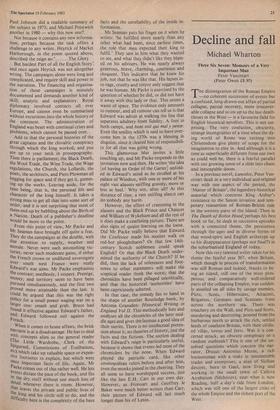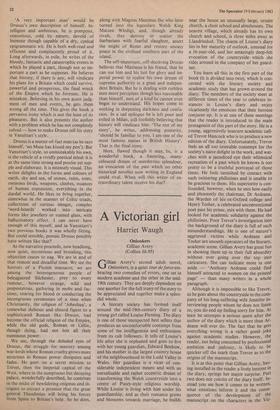Decline and fall
Michael Wharton
Three Six Seven: Memoirs of a Very Important Man Peter Vansittart (Peter Owen £8.95)
rr he disintegration of the Roman Empire I —no coherent succession of events but a confused, long-drawn-out affair of partial collapse, partial recovery, more irrecover- able collapse and so on up to the last death- throes in the West — is a favourite field for English historical novelists. This is not sur- prising. The very confusion, obscurity, strange incongruities of a time when the dy- ing world of Rome was turning into Christendom give plenty of scope for the imagination to play in. And although it is a time'as superficially different from our own as could well be, there is a fearful parallel with our growing sense of a slide into chaos and inescapable doom.
In a previous novel, Lancelot, Peter Van- sittart dealt in a very individual and original way with one aspect of the period, the `Matter of Britain', the legendary-historical material which concerns King Arthur's resistance to the Saxon invasion and tem- porary reassertion of Roman-British rule in the western parts of the island. Then in The Death of Robin Hood; perhaps his best book so far, he dealt in successive episodes with a connected theme, the persistence through the ages and in diverse forms of that wood-spirit and English archetype up to his disappearance (perhaps not final?) in the suburbanised England of today.
Now this very talented writer takes for his theme the fateful year 367, when Britain, which though in process of transformation was still Roman and indeed, thanks to be- ing an island, still one of the most pros- perous and comparatively well-ordered parts of the collapsing Empire, was sudden- ly assailed on all sides by savage enemies, Picts, Scots, Hibernians, Attacotti, Brigantes, Germans and Scanians from across the northern sea. There was treachery on the Wall, and Picts and Scots, murdering and destroying, poured from the barbarous north to attack the rich, settled lands of southern Britain, with their civilis- ed villas, towns and forts. Was it a con- certed attack, an obscure conspiracy or a random outbreak? This is one of the un- solved questions which concern the nar- rator, Drusus Antonius Muras, a rich businessman with a stake in innumerable trades and enterprises, a man of Sicilian descent, born in Gaul, now living and working in the small town of Calleva Atrebatum (Silchester), near what is now Reading, half a day's ride from London, which was still one of the largest cities of the whole Empire and the richest port of the West.
'A very important man' would he Drusus's own description of himself. In- telligent and ambitious, he is pompous, censorious, cold by nature, devoid of humour though capable of a dry, cynical epigrammatic wit. He is both well-read and efficient and complacently proud of it. Long afterwards, in exile, he writes of the bloody, fantastic and catastrophic events in which he played a part, though not so im- portant a part as he supposes. He believes that history, if there is any, will vindicate his plans for a Britain which could survive, powerful and prosperous, the final wreck of the Empire which he foresees. He is mistaken. Believing in his own acute judg- ment of men and events, he gets them wrong all the time. This gives the book a pervasive irony which is not the least of its pleasures. But it also presents the author with a problem which he has not completely solved — how to make Drusus tell his story in Vansittart's style.
Drusus is a matter-of-fact man (as he says himself, `no Muse has kissed my pen'). But Vansittart's style, so unmistakably his own, is the vehicle of a vividly poetical mind: it is at the same time strong and precise yet sup- ple and elaborate. It is intensely visual. This writer delights in the forms and colours of earth, sky and sea, of stones, ruins, trees, ominous birds, weapons, clothes, nuances of human expression, everything in the daedal world. He likes to bring together, somewhat in the manner of Celtic triads, collections of curious images, complex `word-hoards' worked into intricate forms like jewellery or stained glass, with hallucinatory effect. I can never have enough of this myself, and in Vansittart's two previous books it was wholly fitting. But could sensible, prosaic Drusus possibly have written like that?
As the narrative proceeds, now headlong, now quiet, mysterious and brooding, this objection ceases to nag. We are in and of that remote and dreadful time. We see the horrors of a Pictish massacre; we are among the heterogeneous people of beleaguered Silchester, prey to every rumour, however strange, wild and preposterous, gathering in mobs and fac- tions, roaring for blood or conducting the incongruous ceremonies of a time when Christianity, the religion of `Jeheshua', a somewhat dubious and absurd figure to a sophisticated Roman like Drusus, had become the official religion of the Empire, while the old gods, Roman or Celtic, though dying, had not lost all their numinous power.
We see, through the deluded eyes of Drusus, the struggle for mastery among war-lords whose Roman cruelty grows more atrocious as Roman power dissipates and fades. He goes on a secret mission to Troves, then the Imperial capital of the West, where in the sumptuous but decaying palace, wonderfully described, he contrives in the midst of bewildering enigmas and in- trigues to extract a promise that the great general Theodosius will bring his forces from Spain to Britain's help. So he does, along with Magnus Maximus (he who later turned into the legendary Welsh King Macsen Wledig), and, though already rivals, they destroy or scatter the barbarians with fearful slaughter, assert the might of Rome and restore uneasy peace in the civilised southern part of the island.
The self-important, self-deceiving Drusus believes that Maximus is his friend, that he can use him and his lust for glory and im- perial power to realise his own dream of supreme authority in a great and indepen- dent Britain. But he is dealing with ruthless men more percipient though less reasonable than himself, men of a kind he cannot even begin to understand. His hopes come to nothing in deepening darkness and confu- sion. In a sad epilogue he is left poor and exiled in Milan, still foolishly believing that history will vindicate him. 'The rest of my story', he writes, addressing posterity, 'should be familiar to you. I am one of the most famous names in British History'. That is the final irony.
Here, flawed though it may, be, is a wonderful book, a haunting, many- coloured dream of murderous splendour, an evocation of the past which no other historical novelist now writing in England could rival. When will this writer of ex- traordinary talent receive his due?







































 Previous page
Previous page